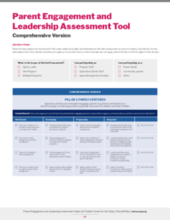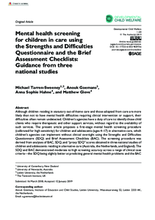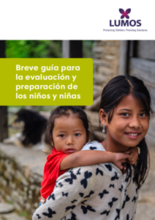Displaying 61 - 70 of 272
This study aims to analyze the comparative effectiveness of Youth Self-Report (YSR) and the Strengths and Difficulties Questionnaire (SDQ) as screening tools of psychological (mal)adjustment, looking for differences in the way psychological problems and difficulties are identified by these two measures in adolescents in residential care (RC).
The primary aim of this study is to summarise research findings about the use of assessment frameworks, that is, structured models that guide information collection and decision making in child protection services, by reviewing the literature.
This resource is designed to help agencies, systems, and collaboratives working with young children and their families to chart a course toward an expanded approach to family engagement.
In order to gain insight into the role that decision-making plays in family preservation practice, the authors of this article studied decision-making within a family preservation (FP)-intervention program provided by the Expertise Center.
This study examined the relationship of caseworker ratings of risk across multiple domains to youth functioning and service use for a sample of children open to the child welfare system.
This study aimed to establish how well the Strengths and Difficulties Questionnaire (SDQ) identified children who required treatment.
The present article proposes a first-stage mental health screening procedure (calibrated for high sensitivity) for children and adolescents (ages 4–17) in alternative care, which children’s agencies can implement without clinical oversight using the Strengths and Difficulties Questionnaire (SDQ) and Brief Assessment Checklists (BAC).
El presente folleto incluye información para preparar a los niños y niñas para que regresen a sus hogares o ingresen a servicios de atención basados en una familia sustituta.
This short human rights in action article takes a critical approach to the translation of policy to practice and highlights risks involved with haste, outcomes measured in numbers and unrealistic timeframes, and rapidly transforming practice with nascent investment in a country’s capacity to assess and respond to the real needs of children and families within their communities.
This paper explores how Black South Africans perceive and experience the adoption assessment process regarding the adoption of abandoned children.




